IPERA
WiFi & Location Analytics
Real-time Visitors Behavior Analytics for Physical Spaces!
Access real-time customer insight, heatmaps, location & zone performance, and venue interaction through built-in WiFi Analytics tools. Ideal for Shopping Malls, Hotels, Hospitals, Airports, Theme Parks, Stadiums, Museums and Venues.
Learn MoreMeet Our Experts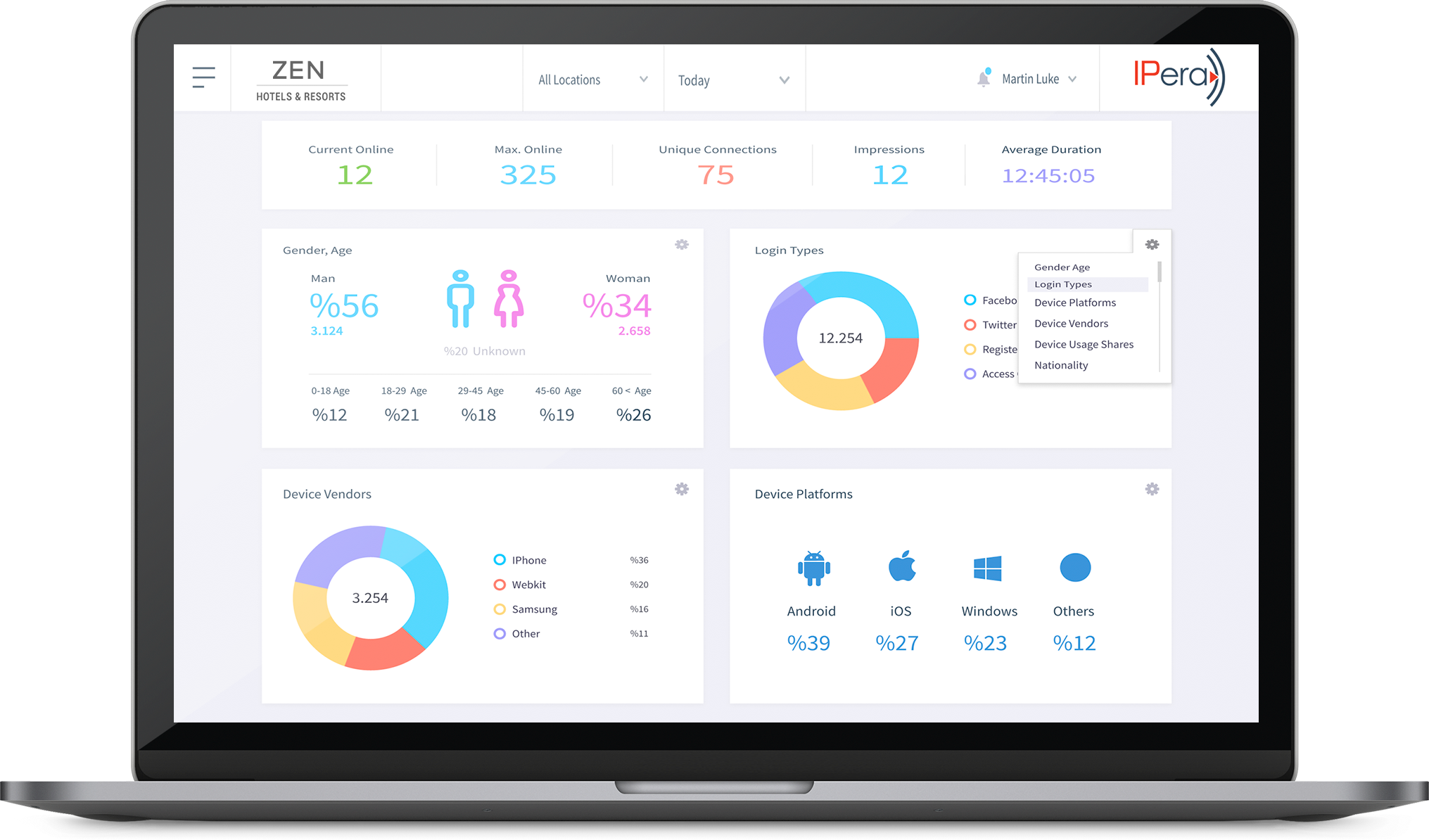
Empowering thousands of businesses globally






























Drive Growth with Smarter Insights
Access various analytical data to gather detailed information about your customers via WiFi analytics technology. WiFi analytics helps businesses utilize the data collected on guest access details through the WiFi network. This technology allows tracking customer data, including connected devices or access points. In addition, WiFi solutions enable both service providers and private stakeholders to have access to valuable information. Insights on real-time visitor behavior and patterns of venue interactions allow businesses to segment their desired audience.
Leveraging IPERA Starling Guest WiFi platform over your existing network, you can access valuable insights through WiFi Analytics. Like web analytics or Google analytics, the platform has built-in real-time venue analytics; footfall analytics, passers-by vs. visitors, conversion & bounce rates, new vs. return visitors, frequency, and loyalty. WiFi Analytics enables business owners and marketers to understand their venues truly. In addition, the platform can capture footfall numbers and visitor analytics even if visitors don’t log in to the Guest WiFi. The platform has a handful of restful APIs, so the data displayed in the WiFi Analytics can be shared with external systems such as CRM or Big Data.
By leveraging our latest Analytics Platform, powered by the IPERA Guest WiFi solution integrated into your existing WiFi infrastructure you can gain unparalleled insights into customer behavior within your store.
With real-time monitoring capabilities, you can track how customers move through your space, pinpoint popular products and hotspots for purchases, and even analyze the duration customers spend in specific areas. This data not only helps optimize your store layout but also enables you to create personalized shopping experiences that resonate with your customers.
Our platform allows you to track foot traffic flow, identify peak hours, and highlight popular zones within your location. This important data allows you to make choices that can lead to business growth and increased customer satisfaction. Transform your physical space into a data-driven success story with IPERA’s Foot Traffic Analysis.
When shoppers have access to free WiFi, they are more likely to spend a longer amount of time browsing. This can lead to exploring additional products, engaging with interactive displays, or simply relaxing and enjoying the shopping environment. Thus, sales increase, and customers explore more opportunities for your products or services. Longer dwell times often translate to increased opportunities for sales performance and engagement.
These insights can guide layout optimization and targeted marketing strategies, resulting in improved operational efficiency and enhanced shopper experiences.
In today's connected world, WiFi technology goes beyond simple connectivity to offer insights for more efficient crowd management. With the IPERA WiFi & Location Analytics platform, businesses can have real-time crowd monitoring features, enabling them to generate detailed heat maps. These heatmaps display the movement patterns of mobile devices overlaid on floor plan maps of the venue, encompassing data from employees, staff, and visitors alike. Through this platform, businesses can easily identify areas of highest or lowest visitor concentration, enabling them to optimize space use and create personalized experiences tailored to their visitors' needs.
This data-driven approach improves space use significantly, making WiFi Heatmaps a marketing tool for businesses. Additionally, it enhances hyper-personalized marketing campaigns, thereby greatly improving customer experiences and operational efficiency.
With advances in technology, businesses that are WiFi owners can now track in real-time exactly how long customers spend in their hotspots, and in which particular areas. By combining ‘presence’ with key demographic information (gender, age, interests…etc) hotspot owners can create a comprehensive customer profile. By analyzing this data, businesses can optimize their layouts and develop targeted marketing strategies to enhance customer experience and encourage spending.
Presence Analytics offers valuable insights into visit trends and dwell times, providing a comprehensive view of foot traffic and guest behavior within your venue. For example, a visitor is that it allows you to generate a unique identifier for each non-connected device, even if it has a random MAC address. IPERA WiFi & Location Analytics platform detects both connected and non-connected Mobile device MAC Addresses and utilizes this information to provide trends of visitors to your venue.
By separating between one-time visitors and repeat customers, and tracking the frequency of their visits, this analytics platform equips you with the data needed to attract, engage, and retain your guests effectively.
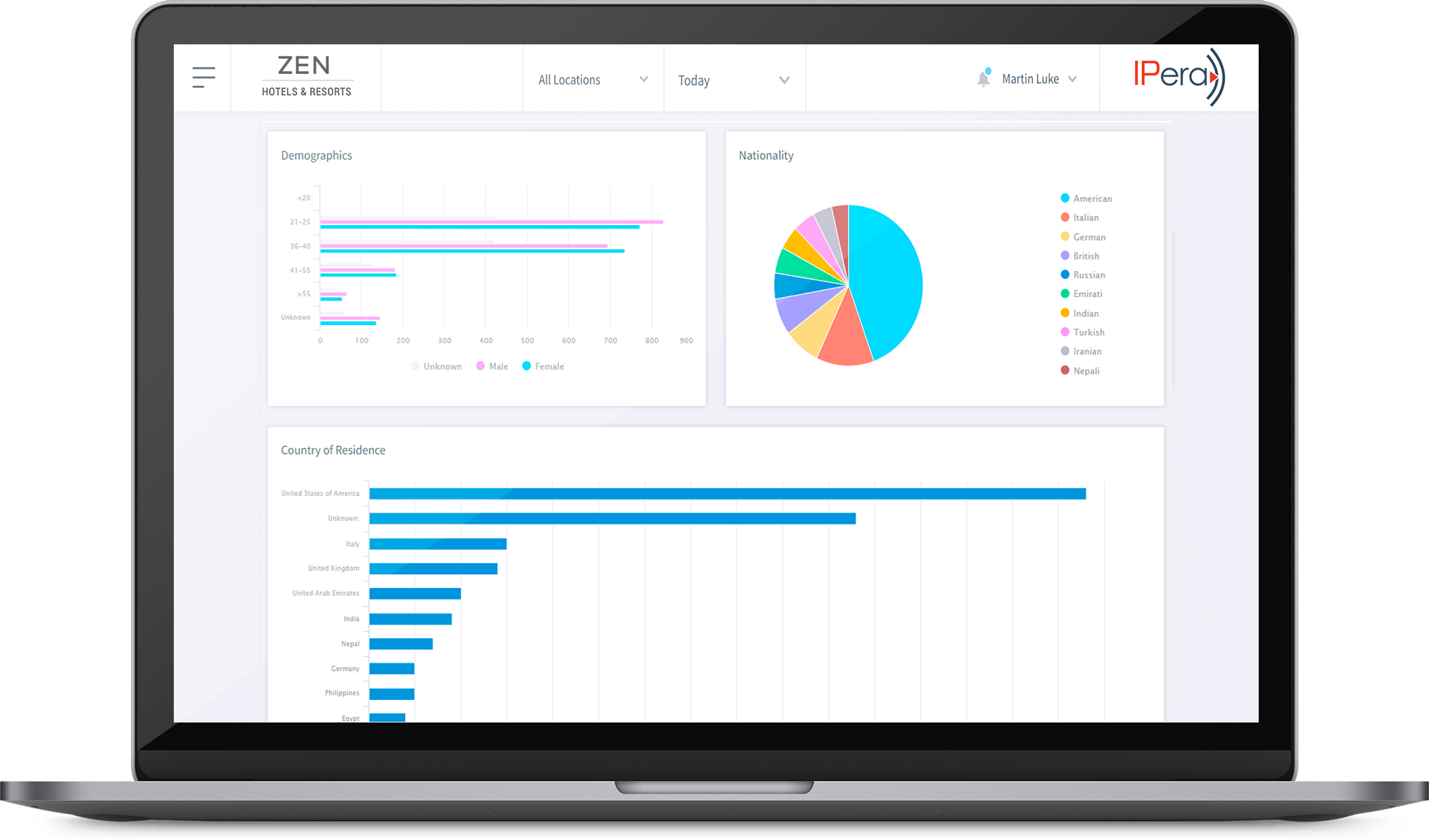
Visitor Flow & Crowd Analytics with Footfall & Heatmaps

IPERA
Discover<br /> Customer Preferences
- Know new customers vs repeat customers
- Learn how different demographics interact with your venue
- Increase your guests’ visit duration
- Discover what they like and dislike on social media
- Learn their preferences: social network, device, browser
- Utilize analytics data to implement targeted marketing campaigns
Key Features of WiFi Analytics
 Real-Time Monitoring
Real-Time Monitoring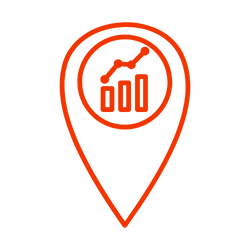 Location Analytics
Location Analytics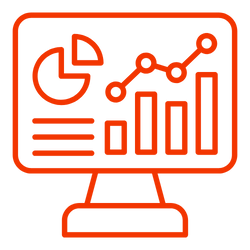 Detailed Reporting
Detailed Reporting Visitor Management
Visitor Management Visitor Heatmaps
Visitor Heatmaps Visitor Footfall
Visitor Footfall  Traffic Analysis
Traffic Analysis Easy Setup & Management
Easy Setup & Management Scheduled Reports
Scheduled Reports Comprehensive Analytics
Comprehensive Analytics Targeted Campaigns
Targeted Campaigns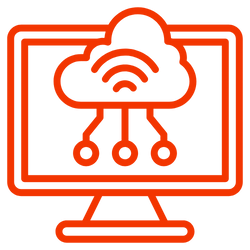 IoT Services Integration
IoT Services IntegrationDiscover the Power of WiFi & Location Analytics
Transform your physical space into a hub of actionable insights—just like your website.
Deep Dive into Your Spaces
Gain a clear understanding of how your venues perform and identify trends across your locations.
Actionable Insights at Your Fingertips
Create custom reports and dashboards tailored to your needs, showcasing data that matters most to you.
Track Visitor Trends Effortlessly
Monitor patterns such as new vs. repeat visits, visit frequency, and more to optimize customer experiences.

Frequently Asked Question (FAQs)
Access various analytical data to gather detailed information about your customers via WiFi analytics technology. WiFi analytics helps businesses utilize the data collected on guest access details through the WiFi network. This technology allows tracking customer data, including connected devices or access points. In addition, WiFi solutions enable both service providers and private stakeholders to have access to valuable information. Insights on real-time visitor behavior and patterns of venue interactions allow businesses to segment their desired audience.
Diversified tools and reports facilitate conducting a comprehensive analysis through WiFi analytics. WiFi analytics platforms established through guest WiFi networks provide businesses much better understanding of their venues. Real-time data can be collected on visitors (new/return visitors), passers-by, frequency of visits, footfall, conversion, and bounce rates. Most importantly, it is possible to capture such data even when visitors are not logged in to the guest WiFi network.
The platform enables the sharing of the displayed information with external sources, including CRM or Big Data. WiFi analytics platform maintains a holistic venue for extensive datasets crucial for your business’s growth.
All the collected data is stored in a centralized database. The real-time customer data includes detailed personal information such as name, age, nationality, gender, contact details, and social interests. Analysis of such data creates insights into customer behavior and preferences for enhanced physical and digital interaction. It allows businesses to differentiate between customer groups and personalize marketing activities accordingly.
IPERA, the service provider for the Advanced Guest WiFi platform, provides cloud-based Guest WiFi, WiFi Analytics, and Marketing through WiFi networks.
WiFi marketing analytics can help your business increase revenues. Knowing your more loyal visitors or offers that capture their attention leads to better-targeted activities. More effective marketing strategies mean fewer resources spent per user.
Guest WiFi networks connect devices to Internet access at a variety of points. It proceeds through user identification. The visitors are asked to log in with their social media accounts or provide authorization by alternative means.
Guest WiFi networks provide specific descriptions of customer engagement when combined with other WiFi analytics tools. WiFi analytics also helps to depict physical space as it provides location analysis. Information on customers’ movement patterns may be beneficial for businesses in driving sales. The use of other technologies, such as BLE beacons together with WiFi analytics facilitates interaction with customers in physical spaces. Thus, it is possible to learn about your customers’ moves. Traffic flow patterns can reveal the exact points where they tend to pause or avoid altogether.
As WiFi networks are widely used in all kinds of sectors ranging from food and hospitality, transportation, and entertainment to retail and services, WiFi analytics provides excellent opportunities for a variety of sectors and businesses.
Collected customer data is processed through different means to create value. Targeted marketing and communication strategies that build upon individual data allow for sending timely messages to visitors. Moreover, you can expand your social visibility and gain customer loyalty through special promotions. Conveying personalized messages through emails or mobile codes to strategically identified guests provides opportunities for building loyalty.
Displaying creative splash pages to visitors upon logging on to guest WiFi networks can reinforce the captive portal experience. Customized guest surveys on splash pages can be presented to gather feedback and additional information. Insights provided by guests help identify areas that need to be improved. In addition, advertisement placements delivered through WiFi networks bring sustained sales and increased revenues. Integrated advertisement spaces on captive portals are increasingly utilized to promote products or loyalty programs.
WiFi analytics helps businesses create added value through a collection of key information. In this respect, having access to offline customer data is vital for businesses. WiFi analytics enables businesses to understand their customers better and draw a more accurate picture of their profiles.
Guest data, including demographics, preferred social networks, devices, and browsers, allow them to learn how customers interact with the venue. Discovering more about their preferences through WiFi analytics helps them implement targeted marketing campaigns. It can ultimately increase customer engagement and visit duration.
Assessment of customer behavior also allows for creating personalized customer profiles. Collecting real-time data on foot traffic or frequency of visits supports businesses in attracting and retaining their visitors. In addition, Hotspot analytics makes it possible for using WiFi networks to extract detailed information on average connection time or bandwidth utilization through unique identifiers. Such data can be used to enhance customer engagement, build tailored marketing strategies, and eventually increase profits. In this way, businesses can optimize in-store and digital customer experiences. Authorized customer data can alter customers’ commitment and engagement patterns. Therefore, your business will be able to save on resources.
IPERA Starling Platform collects location data for both probing and connected mobile devices in row from WiFi vendors such as Cisco, Aruba, Ruckus, Cisco Meraki, Extreme Networks, etc. It processes the data to provide insights and analytics for business owners. Business owners make decisions better using the data.
IPERA acknowledges the right of customers to access their collected personal information, amendment of inaccurate or incomplete data as well as their erasure in line with the relative articles of the General Data Protection Regulation (GDPR) of the European Union. Residents of the EU have the right to request full transparency relating to the collected data as well as copies of their personal information.
IPERA, as a Guest WiFi provider, complies with the GDPR, which regulates data privacy in Europe. Therefore, it essentially puts control of personal data in the hands of individual users. Information on device type, operating system or browser, IP address, amount of traffic, etc. is collected on customers’ behalf when guest WiFi solutions are used. IPERA gathers and aggregates merely anonymous data in reports drafted for its customers. Location data is collected only from connected devices to monitor paid visits to guest access venues. The collection of such information supports IPERA to enhance user experience if users have opted to accept tailored informational communication. As IPERA customers may choose to operate the portal on their own or opt for delivery of online services on their behalf, processing of collected information on customer engagement falls under their respective privacy policies.
The users have the right to access their collected personal data and to ask for withdrawal if necessary. Breach of this critical consumer right could result in penalties of up to 20 million euros or 4% of the company’s revenues. As an advanced and experienced guest WiFi service provider, IPERA adheres to the GDPR and fully complies with the EU’s customer privacy policy regulations.
WiFi & Location Analytics
GET IN TOUCH
To contact us, you can call our offices or fill out the demo form.
